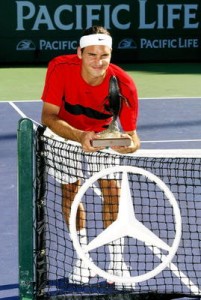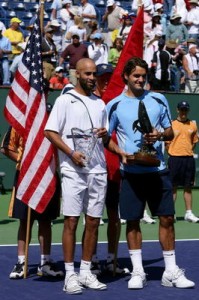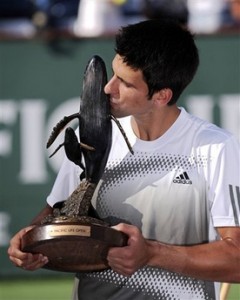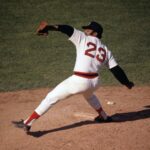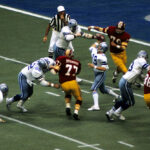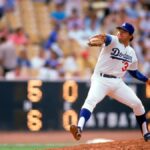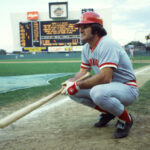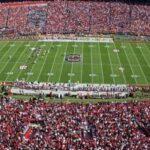Roger Federer’s March to the Top Begins at Indian Hills This Week
No doubt the anti-Federer-contingent cannot be happy with the recent results of the tennis star who will not die or fade away—even after turning 30.
Just when they think the Swiss fountain of youth has congealed into lumpy cheese fondue, Federer revives his game and comes back free-flowing as he did during his dominating best.
Such was the case recently in Dubai. The hard, fast courts in the United Arab Emirates desert suited Federer just fine as he rebounded from predicted obscurity to reclaim his fifth title in Dubai 7-5, 6-4—much to the shock and dismay of Andy Murray and the Scot’s camp.
Murray had pulled his own coup d’etat by upsetting the No. 1 seed and reigning world champion Novak Djokovic in the semifinals. Murray, however, was not able to arrest the development of the Federer forehand on the hard courts of Dubai, losing in straight sets in the final.
No other man has won five tennis titles in Dubai. The courts there suit Federer’s game—which may explain why Nadal has been absent from the Dubai desert since 2008.
Once the world No. 2 figured out that he had to ration his playing time, Dubai was sacrificed because the hard courts, especially the faster hard courts, took too much out of Nadal’s vulnerable knees.
Just as well for Federer’s fans. Playing Nadal often becomes a non-productive exercise for the 16-grand slam champion. Before each major, Federer’s backers sink to their knees praying to play Djokovic or Murray before Nadal. Much of it has to do with the “confidence level” Federer spoke of after his recent victories over top ten opponents.
After winning 33 of his last 35 matches, Federer will enter the contest at Indian Wells with renewed confidence and vigor. Since losing his semifinal battle with Novak Djokovic at the US Open, the world No. 3 has captured titles at the World Tour Finals in London, overcoming Jo-Wilfried Tsonga in the final.
Prior to Dubai, Federer claimed the title in Rotterdam over Juan Martin del Potro. Now the Swiss has captured this outdoor title in Dubai defeating world No. 4 Andy Murray.
In his continuous march into the record books, Federer has now notched win No. 72 compared to 30 losses in tour finals. In the past six months, Federer has only lost twice—in his semifinal defeat at the 2011 US Open and his strange loss to John Isner in Switzerland on clay during the recent Davis Cup tie.
Of course, Federer lost unofficially in an exhibition match against perennial US favorite Andy Roddick at Madison Square Garden 7-5, 7-6 on Monday night, March 5, 2012. All of this excitement was part of the USTA’s Tennis Night In America which packed in about 18,000 tennis-starved fans.
This loss should in no way deter Federer’s confidence as he heads to California to participate in the BNP Paribas Open at Indian Wells, getting underway on March 8.
Federer won this title consecutively for three years from 2004-2006. His first year competing in the tournament came in 2001 when the Swiss lost in the first round to German Nicolas Kiefer 3-6, 7-5, 6-1. Andre Agassi won the tournament that year.
In 2002 Federer came into Indian Wells seeded No. 12, advancing to the third round where he lost to Swede Thomas Enqvist 6-4, 6-3. That year Lleyton Hewitt won the first of two back-to-back titles.
In 2003 Federer arrived seeded fourth—losing to Gustavo Kuerten 7-5, 7-6 in the second round. Kuerten would advance to the finals before losing to defending champion Lleyton Hewitt that year.
Finally, in 2004, Federer began his period of domination at this event—winning three in a row. The Swiss defeated Brit Tim Henman 6-3, 6-3 that year. In 2005 Federer took out former champion Aussie Lleyton Hewitt 6-2, 6-4, 6-4, playing a best of five format in the final.
In 2006 the World No. 1 defeated James Blake in the final at Indian Wells 7-5, 6-3, 6-0 to win his third consecutive championship at this tournament. No other man has won this event three consecutive times, although Michael Chang has won it three times in 1992, 1996-1997.
In 2007 Federer was dismissed by Guillermo Canas in the second round 7-5, 6-2. It was a shocking upset which would be repeated in Miami the following tournament, shaking the confidence of the world No. 1. Rafael Nadal would win his first championship at Indian Wells in 2007.
Federer returned to form in 2008 but inexplicably lost lamely to a resurgent Mardy Fish 6-3, 6-2. Novak Djokovic who turned away defending champion Rafael Nadal would defeat Fish in the final, winning Indian Wells for the first time 6-2, 5-7, 6-3—seeing the tournament once again returning to a best of three format.
In 2009, Federer advanced to the semifinals where he was defeated by Scot Andy Murray 6-3, 4-6, 6-1. Murray, however, could not sustain his winning effort and faded in the final which Nadal won easily 6-1, 6-2.
2010 became the year of immense upsets. Federer, once again seeded No. 1, was upended by Cypriot Marcus Baghdatis in the third round 5-7, 7-5, 7-6. The 2010 final showcased American Andy Roddick and Croat Ivan Ljubicic. In the end Ljubicic won the day overcoming Roddick 7-6, 7-6.
Last year, of course, was the year of Djokovic—who won every tournament he contested until the 2011 French Open. Federer entered the tournament seeded and ranked No. 2. After losing to Djokovic 6-3, 3-6, 6-2 in the semifinal round and after Djokovic defeated Nadal in the final 4-6, 6-3, 6-2—Federer fell to world No. 3.
Federer comes into Indian Wells this year as the No. 3 seed, aspiring to improve his ranking—as always.
All he must do is work his way through the draw to the final once again. Standing in Federer’s way is Canadian superstar in-the-making, Milos Raonic in the third round. Should Federer survive that encounter, no doubt, he will face Austrian Jurgen Melzer who just won in Memphis or perennial top 20 foe Frenchman Gael Monfils, seeded No. 14.
The quarterfinal opponent could conceivably be No. 5 seed David Ferrer or No. 9 Juan Martin del Potro. Of course, should Federer make it this far, his semifinal opponent will more than likely be the world No. 2 Rafael Nadal.
Then to polish off a hard-fought week of competition, Federer would face either Djokovic or Murray in the final, depending on which of those two manage to survive a rigorous quarter of their own respective draws.
Federer has won at Indian Wells three times. In 2012, he would love to make it four.
Then do it all over again the following ten days in Miami…
